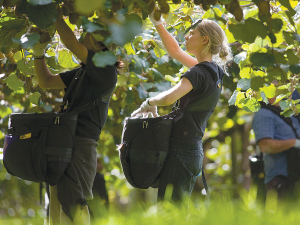New Summerfruit NZ CEO
Dean Smith has been in the role of CEO of Summerfruit NZ for about four months, having succeeded Kate Hellstrom at the end of September.
 Summerfruit NZ estimates up to half of the season's cherry crop was spoiled by severe rain over the new year period.
Summerfruit NZ estimates up to half of the season's cherry crop was spoiled by severe rain over the new year period.
What was expected to be a bumper cherry crop this year has been badly hit by untimely wet weather.
A three-day rainstorm started on New Year’s Day and drenched the prime orchard areas of Central Otago. Fruit has split because of their excess water uptake, with Summerfruit NZ estimating that up to half the region’s cherry crop has been spoilt – resulting in the loss of $50 million in export revenue.
Flooding also caused damage to buildings and plantings in the Earnscleugh area, just across the Clutha River from Clyde and Alexandra, when the Fraser River burst its banks. Summerfruit NZ believes the damage to trees will potentially affect next season’s crop as well.
Veteran orchardist Harry Roberts’ Earnscleugh properties narrowly escaped the flooding, but he says the effects of the rain are still being felt. His family orchard consists of three blocks growing cherries, apricots, peaches, nectarines and plums for both export and local markets.
The wet ground means the cherries were continuing to crack even into mid-January. Roberts told Hort News that when he was showing a television news crew around “…the cherries were just opening up in front of us”. He says
a lot of these trees won’t even be picked.
“It doesn’t matter what fruit it is – it’ll get damaged when you get too much rain. When you get over 100mm of rain there’s not much that survives,” he explains.
“Different blocks have different problems, we walked out of two blocks yesterday that were just hammered, and to sort through it, it takes a lot.”
Roberts says while he narrowly escaped the flooding, it was a close thing.
“It caused a problem for about three days, but we didn’t get the Fraser River water,” he told Hort News. “Our blocks are a wee bit away from that.”
Orchardists are now working to try to “salvage some dollars.”
“It’s a lot of money going out of the district and it’s a lot of money for New Zealand,” Roberts adds. “You work 12 months to get a crop on a tree and it’s bloody disastrous for some people.”
Summerfruit NZ chief executive Richard Palmer says the persistent and heavy rain was something not experienced in 40 years. It came in a season when growers were concerned that Covid would leave them without enough overseas pickers.
Palmer told Hort News that growers had been starting to feel optimistic that most of their fruit would be picked thanks to the “fantastic” response from New Zealanders and stranded backpackers helping with the harvest.
However, he says with the current good weather pickers are helping with the rest of the harvest. Mainly cherries and some apricots were affected by the storm. However, other summerfruit was looking good, with peaches and nectarines now coming on about a week earlier than usual.
“It is incredibly sad to see growers lose so much of their crop in this way,” Palmer says. “Growers are working hard to harvest the remainder of the crop, and with
good weather ahead there is still substantial work for pickers and packers.”
He added that the sector also feels for all the people who came to help with the harvest as they had responded “so generously to the industry’s call for help.”
Controls on the movement of fruit and vegetables in the Auckland suburb of Mt Roskill have been lifted.
Fonterra farmer shareholders and unit holders are in line for another payment in April.
Farmers are being encouraged to take a closer look at the refrigerants running inside their on-farm systems, as international and domestic pressure continues to build on high global warming potential (GWP) 400-series refrigerants.
As expected, Fonterra has lifted its 2025-26 forecast farmgate milk price mid-point to $9.50/kgMS.
Bovonic says a return on investment study has found its automated mastitis detection technology, QuadSense, is delivering financial, labour, and animal-health benefits on New Zealand dairy farms worth an estimated $29,547 per season.
Pāmu has welcomed ten new apprentices into its 2026 intake, marking the second year of a scheme designed to equip the next generation of farmers with the skills, knowledge, and experience needed for a thriving career in agriculture.

OPINION: Here w go: the election date is set for November 7 and the politicians are out of the gate…
OPINION: ECan data was released a few days ago showing Canterbury farmers have made “giant strides on environmental performance”.